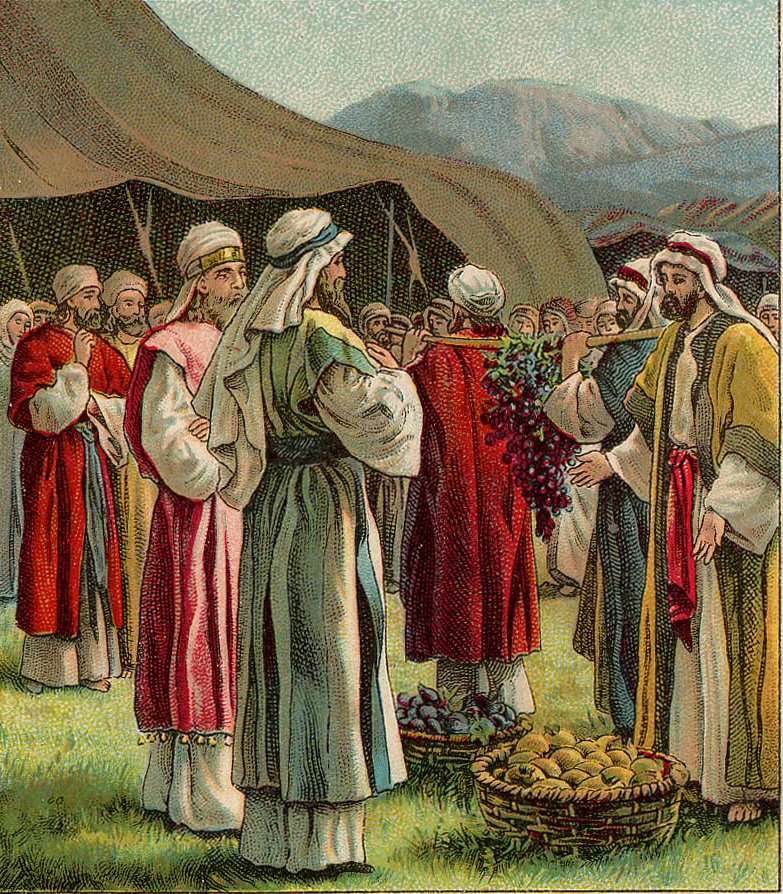Don’t Take the Worry Detour
(You can listen to the audio version at the bottom of the page.)
The Israelites had left Egypt hundreds of miles back. At the border of Canaan, Moses sent twelve men to scout out the land ahead of them. When they returned, ten of the twelve said they shouldn’t enter the land. That day, their worry blew a cold wind into the camp.
 Worry seizes the imagination
Worry seizes the imagination
By a few millennia, those dozen spies anteceded Lewis and Clark’s Corps of Discovery in the United States. Their similar assignment: explore the Promised Land, study the terrain and the crops, report samples of their findings to Moses and the rest of Israel. Ten of the men returned shaken, aghast at the thought of inhabiting the strange land as if it was a dangerous other planet.
Since God had sent them, and since they carried back impressive examples of produce, they should have returned saying, “We’re winners!” Instead, the ten came back as worriers.
“But the people living there are powerful… We even saw giants there” (Numbers 13:28, NLT). “They are stronger than we are!” (verse 31). They whimpered, “Next to them we felt like grasshoppers” (verse 33)!
Worry hides today’s sunshine
The good news: the cluster of grapes and other fruit they brought back (verse 23). It meant a variety of food to replace manna as their steady diet.
The bad news: the size of some of the people dwelling in Canaan. Thinking about the people more than the produce, the ten scouts worried themselves into forgetting that God had promised the land to them.
Today’s clouds—their worry—prevented them from seeing tomorrow’s sunshine. Sunshine God had guaranteed.
What’s more, their nervous fears agitated the rest of Israel. The report should have been a celebration. Something worth a parade. But the worries of the ten gloomy scouts rained on that parade.
Worry steals emotional and physical health
The oft-repeated statistic is that 90% of what we worry about never happens. Other facts are more sobering. Dr. Charles Mayo, the founder of Mayo Clinic, discovered a relationship between worry and physical health: “Worry affects the circulation, the heart, the digestive system and the entire nervous system.”
As for the disturbed Israelites, “Then the whole community began weeping aloud, and they cried all night” (Numbers 14:1, NLT). The ten fatalistic scouts had given such a persuasive report that the people were ready to revolt, to replace Moses as their leader, and head back to Egypt to live as slaves again (Numbers 14:4).
God didn’t allow Israel to enter Canaan at that time. Thirty-eight years later, the next generation took the land.
Worry Discounts God
Worry is never a shortcut to advancing on our spiritual journey. It’s a detour. It suggests that God isn’t fully in control.
When we worry about tomorrow, we miss God’s blessings for today. When we treat problems that may never occur as if they are certain to happen, we remove the faith factor from our expectations.
Only God can concentrate on all the details of all our tomorrows. When we take it upon ourselves, we’re like the man who learned to be a juggler, but only after buying his wife a new set of dishes, four times. The difference is, we’ll never learn to juggle it all. Only God can.
Jesus said in Matthew 6:34 (NLT), “So don’t worry about tomorrow.”
Escape the Worry Detour
Ten of Israel’s scouts saw only giants. The other two saw God who was bigger than giants. The ten said, “We can’t.” The two said, “God will.”
When the Apostle Paul faced problems in His spiritual journey, he looked beyond his problems to His provider.
“Now to Him who is able to [carry out His purpose and] do superabundantly more than all that we dare ask or think [infinitely beyond our greatest prayers, hopes, or dreams], according to His power that is at work within us,” (Eph. 3:20, AMP).
The Road Ahead:
- Sometime in the 14th-century people began using the word Providence to describe God working in their lives. Derived from the word provide, Providence defines God as our guide and protector. How do you need to trust Providence instead of taking the worry detour?
- What would you include on a short list of concerns you need to surrender to God right now ?
Further Fuel: Proverbs 3:5-6; Philippians 4:6-7.
